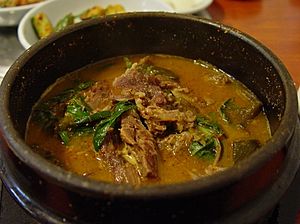Bosintang facts for kids
 |
|
| Alternative names | gaejangguk, dangogiguk, gaejang, gujang, jiyangtang |
|---|---|
| Type | Tang |
| Place of origin | Korea |
| Main ingredients | Dog meat, vegetables |
| Korean name (South Korea) | |
| Hangul | |
|---|---|
| Hanja | |
| Revised Romanization | Bosintang |
| McCune–Reischauer | Posintang |
| IPA | [po.ɕin.tʰaŋ] |
| alternative name | |
| Hangul | |
| Hanja |
개醬국
|
| Revised Romanization | Gaejangguk |
| McCune–Reischauer | Kaejangkuk |
| IPA | [kɛ̝.dʑaŋ.k͈uk̚] |
| Korean name (North Korea) | |
| Chosŏn'gŭl | |
|---|---|
| Revised Romanization | Dangogiguk |
| McCune–Reischauer | Tangogikuk |
| IPA | [tan.ɡo.ɡi.k͈uk̚] |
Bosintang (보신탕; 補身湯) is a traditional Korean soup. It is also known as gaejangguk (개장국) in South Korea. In North Korea, it is called dangogiguk (단고기국).
This soup's main ingredient is dog meat. It is cooked with different vegetables. These include green onions, perilla leaves, and dandelions. Spices like doenjang (a fermented soybean paste) and gochujang (a chili paste) are added. Perilla seed powder is also used. Before eating, it is often seasoned with agastache rugosa (a type of mint).
Bosintang is one of the most common Korean dishes made from dog meat. It has a long history in Korean culture. People have believed it can give them more energy and strength.
Contents
A Look at Bosintang's History
The practice of eating dog meat goes back a very long time in Korea.
Ancient Times
- Neolithic Era: Scientists have found dog bones in ancient settlements. One example is in Changnyeong, South Gyeongsang Province. This shows that dogs were part of people's lives even then.
- Goguryeo Kingdom (4th century AD): An old wall painting was found in the Goguryeo tombs complex. This site is a UNESCO World Heritage site. The painting shows a slaughtered dog in a storage area. This suggests that dog meat was used during this ancient kingdom.
Joseon Dynasty and Later
- 1816 Poem: Around 1816, a scholar named Jeong Hak Yu wrote a poem. It was called Nongawollyeonga. This poem described the daily lives of Korean farming families. In the part about August, it mentions a woman visiting her parents. She brings boiled dog meat, rice cake, and rice wine. This shows that dog meat was a popular food at that time.
- 1849 Recipe Book: In 1849, a Korean scholar named Hong Suk Mo wrote a book. It was called Dongguk Seshigi. This book included a recipe for boshintang. It listed boiled dog and green onion as ingredients.
Connection to Yukgaejang
Bosintang is related to another Korean soup called Yukgaejang. One of Bosintang's other names is gaejangguk. If you replace the dog meat in gaejangguk with beef, you get Yukgaejang. The word 'yuk' means beef in Korean. So, Yukgaejang is like a beef version of gaejangguk.
Modern Status in South Korea
Many people think that eating dog meat is completely illegal in South Korea. However, this is not true. Dog meat is not listed as "livestock" under a specific law. This means that the rules for raising and preparing it are different. They are not as strict as for other meats like beef or chicken.
Even so, dog meat dishes like Bosintang are still eaten regularly. You can find them in many restaurants across South Korea. In 2006, dog meat was actually the fourth most eaten meat in South Korea. It was consumed after beef, chicken, and pork.
Different Names for the Dish
This soup has many different names in the Korean language. Each name often gives a clue about what people think of the dish.
| Romanization | Hangul | Hanja or mixed script |
Meaning |
|---|---|---|---|
| boshintang | 보신탕 | 補身湯 | "invigorating soup" (meaning it gives strength) |
| yeongyangtang | 영양탕 | 營養湯 | "nutritious soup" |
| boyangtang | 보양탕 | 補養湯 | "invigorating soup" |
| gaejang(guk) | 개장(국) | 개醬(국) | "dog soy bean paste soup" |
| sacheoltang | 사철탕 | 四철湯 | "soup for all seasons" |
| dangogitang | 단고기탕 | 단고기湯 | "sweet meat soup" (a traditional name in North Korea) |
| gutang | 구탕 | 狗湯 | "dog soup" |
| gujang | 구장 | 狗醬 | "dog soy bean paste soup" |
| jiyangtang | 지양탕 | 地羊湯 | "land sheep soup" |
| meongmeongtang | 멍멍탕 | 멍멍湯 | "woof woof soup" (a playful name) |
See also
 In Spanish: Bosintang para niños
In Spanish: Bosintang para niños
 | Sharif Bey |
 | Hale Woodruff |
 | Richmond Barthé |
 | Purvis Young |

